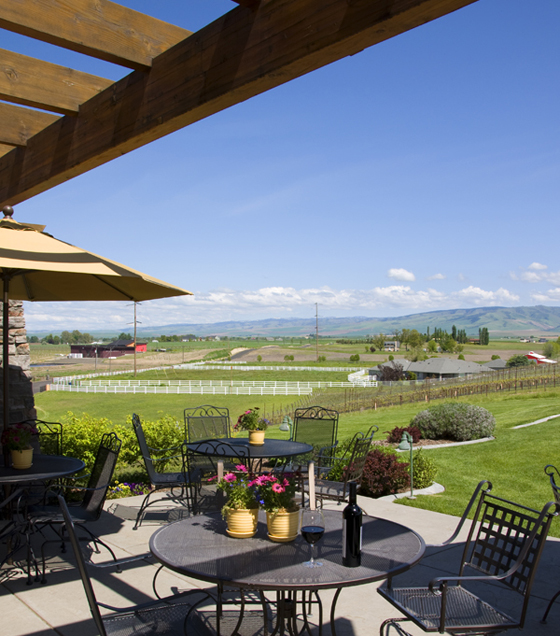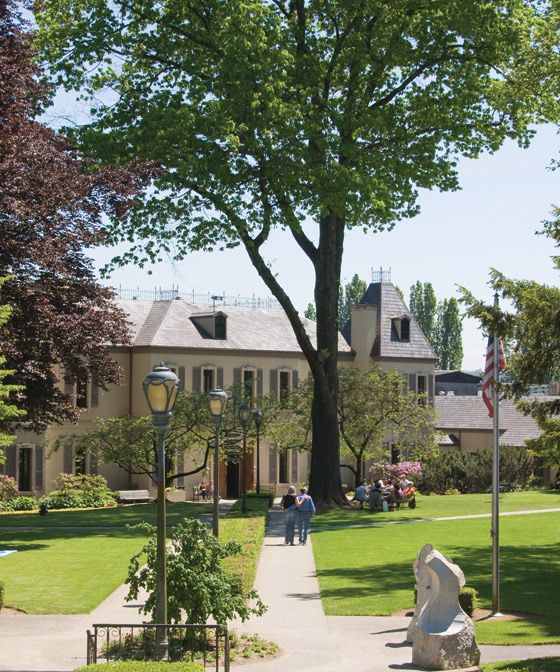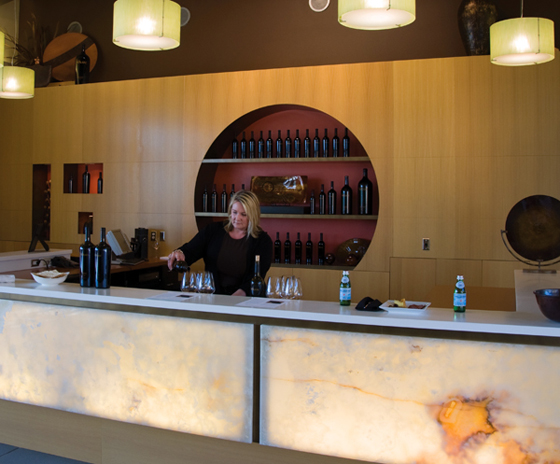Rediscovering magnificent Chateau Ste. Michelle and touring three sister wineries
No two pearls in the world are identical. Few understand this as well as Ted Baseler, CEO and president of Ste. Michelle Wine Estates, whose keen eye for sizing up valuable pearls of a different nature has led his company to success. His talent for collecting noteworthy wineries—both large and smaller scale ones—has helped position Ste. Michelle as the fastest growing wine company in the United States for the past two years, where they now rank seventh largest overall.
Baseler describes his company as a “string of pearls,” each winery an independent gemstone held together by the invisible string of the corporation. Their first pearl was Chateau Ste. Michelle. Today, others include Stag’s Leap in Napa Valley, Erath of Oregon, Spring Valley Vineyards, Northstar, Col Solare, and Columbia Crest.
“We keep each one of these wineries separate from a wine crafting perspective so that they have their own identity,” Baseler explains. “Each winery has its own facility and tasting room, its own winemaking team, its own estate vineyard, its own legacy—which is the essence of that pearl.”
We visited four Ste. Michelle estate wineries right here in Washington to get a taste of each. Afterwards, we met up with Ted Baseler and asked him what the future holds for Washington wine enthusiasts. He grinned, “If you like it now, in ten years you won’t believe this industry. It will be spectacular.”
Chateau Ste. Michelle, Woodinville
Revisiting the original pearl that established Washington State as a heavyweight among the world’s wine producing regions, it’s plain to see why this winery is still a magnet for more than 300,000 wine-loving visitors each year. From the instant you roll up the vineyard-lined drive, you’re whisked off to an elegant estate reminiscent of the French countryside. The winery sits on 87 wooded acres, complete with manicured gardens, fountains, tall trees and rolling green lawns.
Easy access from Seattle and loads of activities keep locals coming back (aside from impressing out-of-town friends). Chateau Ste. Michelle’s hosts wine tasting classes, chef dinners, outdoor summer concerts, and wine and cheese nights. Check their website for details.
With distribution in 70 countries, Chateau Ste. Michelle produces wine for nearly every taste bud. One of their most popular wines is their Riesling. They make up to eight different Rieslings alone, including the award-winning Eroica, made in partnership with Ernest Loosen of Germany. Other top sellers include their Chardonnay, Merlot and Cabernet Sauvignon, with seemingly endless choices of each varietal. Chateau Ste. Michelle’s estate vineyards include the respected Cold Creek, Canoe Ridge and Horse Heaven Vineyard.
If you tend to make a beeline to the tasting bar, you may have overlooked their free guided tour. If so, try circling back next time and check out the winery’s history and facility. Visit Monday through Thursday and you can survey the winemaking team in action on the bottling line. The tour concludes with a complimentary tasting of Columbia Valley wines in the new tasting room area.
Col Solare Winery, Benton City
Two and a half years after opening, Col Solare remains a bit of a mystery to many travelers who casually look up from other Red Mountain wineries below and glimpse the striking facade perched high atop the barren hillside. One visit and you’ll feel like the kid who discovered the toy surprise inside a box of Cracker Jacks.
Sweeping vistas, a private tour and remarkable architecture, not to mention ultra-luxe red wine, make this a truly memorable tasting experience. Visits are by appointment only, so remember to phone a few days ahead, even up to two weeks prior on busy weekends.
Behind this pearl lies centuries of Italian winemaking tradition. Tuscany’s legendary Marchesi Antinori’s family has been making wine for over 600 years, and when Antinori decided to produce fine Bordeaux with big, bold fruit grown in Washington, he reached out to Chateau Ste. Michelle to be his partner. The news of this astounding partnership made headlines across every mainstream media outlet in Italy.
Col Solare is Italian for “shining hill”—even the estate vineyards are planted in rows that resemble individual rays of sunshine shooting outward from the winery.
The place is a wonderful fusion of ancient looking massive stonewalls, modern glass and metal, and even has a European style bell tower. Like the armored shell of an armadillo’s back, a low-arching metal roof protects and covers the entire complex. Blending into the slope of the hill, the building is awash with Tuscan hues that seem to change with the sunlight.
Step inside and chances are you’ll be greeted with a warm smile from hospitality manager Wendi Warner, a self-confessed “foodie.” Tasters can stroll outside to a large patio and soak up panoramic views that look across the Yakima Valley and Horse Heaven Hills from one of the highest vantage points on Red Mountain.
You can choose from three tours: a 30-minute wine tasting in the upstairs tasting room; a one hour tasting appointment that includes a tour of the estate vineyard, winery and barrel cellars; or a 90-minute tour of the entire facility, complete with gourmet aged cheeses, cured meats, and chocolates carefully paired with each vintage. Splurge and treat yourself to the latter, which finishes in the Barricaia, a barrel-aging cellar reminiscent of European wineries with a classic Florentine doorway entrance.
Other opportunities to visit Col Solare are during their seasonal events. “The Golden Hour” is a sunset wine tasting held the second Saturday of the month through October. Check their website for event details.
Northstar Winery, Walla Walla

Like the star in the northern sky that guides travelers homeward, this pearl is committed to shining a light on Washington Merlot.
The best way to appreciate the deep complexity of Northstar wine is a trip to the winery, where you can sample Merlots from the Columbia and Walla Walla Valley side by side. Each has its own distinctively luxurious aromas and flavors.
An outing to Northstar Winery is a getaway in itself, surrounded by 12 acres of estate vineyards in an idyllic, pastoral neighborhood in south Walla Walla. Pack a snack and enjoy picturesque views of the Blue Mountains from the patio. A bonus tip: At the winery you can also sample their tasting room-only releases, called “components,” because they are used in tiny blending amounts with the Merlot. Their Cabernet Sauvignon, Cabernet Franc, Syrah and Petite Verdot are a definite treat.
Northstar’s real shining star is winemaker Dave Merfeld, or Merf for short. Ask Merf what his job description is and he’ll shoot you a quick reply: “To make the best Merlot in the world.” He’s not kidding, either.
In a blind tasting competition held earlier this year at the South Beach Wine and Food Festival in Miami, Florida, the Northstar 2005 Walla Walla Merlot was voted #1 overall, beating five premier Bordeaux wineries from France’s famed Right-Bank region.
Raised on a Midwest farm, Merf learned to take pride in his work at an early age. He recalls how his dad used to take satisfaction in planting the straightest rows of corn in town. Some of that spirited drive and determination rubbed off on Merf. When he’s not making wine, he’s busy training for triathlons and taking horticulture classes at Washington State University. “Winemaking is a lifelong continuing process of learning and adjusting to what we find out from our region,” Merf explains.
So exactly how does one go about trying to make the best Merlot in the world? “Whatever it takes,” Merf says. “Great winemaking is a balance of science and art, and a good palate. All those come together to make the wine.”
Merf believes the end product is not just about wine, it’s about life’s experiences that go with it. “We’re making history every day. Someone will serve the wine we make today at their son’s graduation, or their daughter’s wedding, or job promotion or the holidays. I think about that every time I see the smiles on people’s faces.”
Spring Valley Vineyard, Walla Walla
Mosey into the Spring Valley Vineyard tasting room in downtown Walla Walla and you’ll find yourself face to face with members of one of the valley’s oldest farming families. Sepia-toned portraits and circa 1900’s photographs adorn a large rustic wall, making it easy to trace Dean Derby and Shari Corkrum Derby’s family roots back to her great-grandfather who homesteaded in the Walla Walla Valley in the mid-1800’s.
The legacy of this pearl is stamped into the wine labels, with names that pay tribute to the generations who have farmed the land where Spring Valley Vineyard now stands. Their Merlot blend is named after Shari Corkrum Derby’s grandfather, Uriah. The Cabernet Sauvignon blend is named Frederick, in honor of her father. And the 100% Syrah is named after Frederick’s wife, Nina Lee. Perhaps the name that arouses the most curiosity is Mule Skinner, 100% Merlot that gets its name from Frederick’s early job title on the ranch. Back in those days the Mule Skinner was the person who drove all the mules that performed the grueling work later replaced by modern tractors.
“The faces on the labels are all real people that our customers can connect with on a family level. We get a lot of visitors that make comments like, ‘that looks like my grandfather,’” says Shari’s granddaughter, Kate Derby Raymond.
The winery business hasn’t always been rosy for the Derby’s. In 1993, they decided to diversify their wheat crop by trying their hand at growing and selling wine grapes. Successful with their vineyards, the Derby’s soon recruited their son and talented winemaker, Devin Derby, to launch and manage their own estate winery. From the get-go, Spring Valley has consistently produced prized estate wines.
Tragedy struck when Devin was killed in an auto accident in 2004. Grieving from their loss and overwhelmed with the day to day winery operations, Dean Derby phoned up Ted Baseler at Ste. Michelle Winery Estates. The two had met by chance some time earlier while sitting next to each other on an airplane. Struggling to keep the winery running, Derby asked if Baseler was interested in buying it.
As Baseler recalls, “We sat together in their living room trying to figure out how we could do something that would work for them, so they could continue to own their land but take this pressure off.” They sealed a deal on a handshake and the winery was saved. “For our part, we’re thrilled to be involved in this terrific vineyard and brand, and the legacy the Derby’s have created,” Baseler points out.
Just as it began seven generations ago, Spring Valley is still all about family. The vineyard and winery are thriving under the watchful eye of the Derby’s. Family friend and artisan winemaker Serge Laville carries on the tradition of creating big, classic, red estate wines that garner all sorts of critical acclaim. Dean’s brother, Gaynor Derby, manages the vineyard while granddaughter Kate Derby Raymond conducts ranch tours and assists in the tasting room.
Drop by sometime and pay your respects to Uriah, Frederick and Nina Lee. And don’t forget to sample the Mule Skinner.
Written by John Vitale


